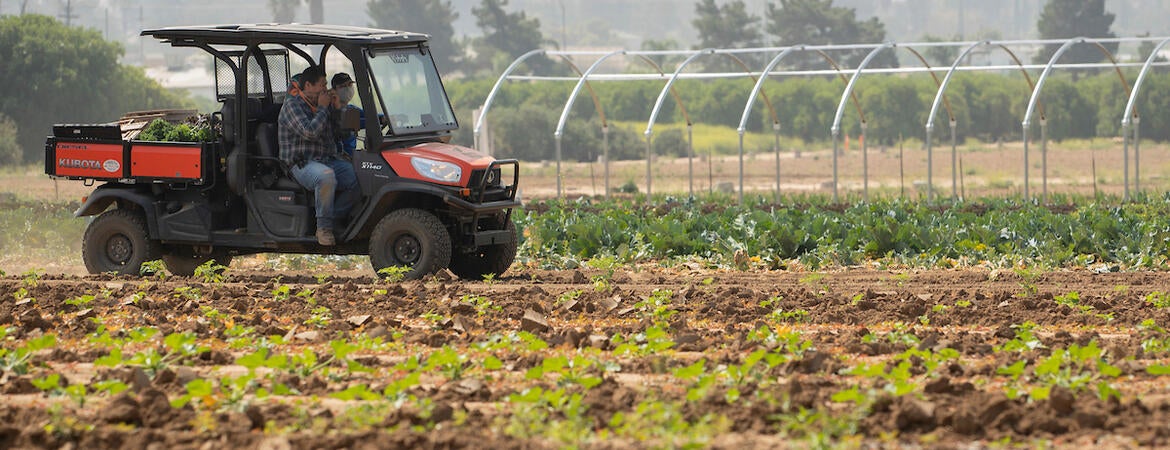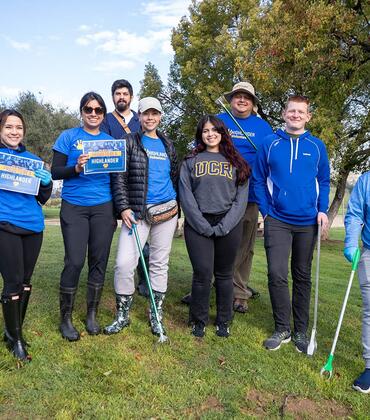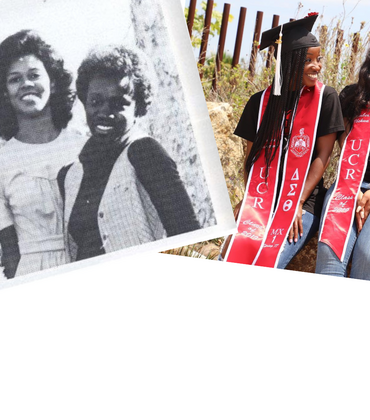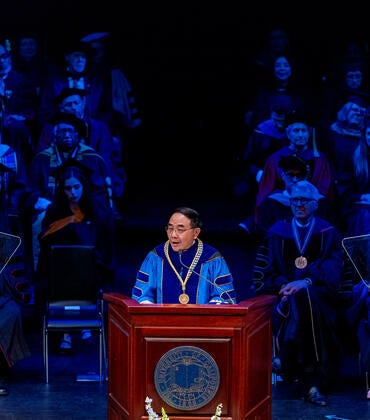
A $342,000 grant will allow more Latinx students at UC Riverside and UC Berkeley to conduct environmental and climate change research.
The project, “Latinxs and the Environment: Partnerships to Pave Pathways to the Professoriate,” is funded by the University of California Hispanic Serving Institutions Doctoral Diversity Initiative and will be led by UCR and UC Berkeley. The program has a dual emphasis: encourage and create environmental research opportunities for undergraduate and graduate Latinx students and create new pathways for graduate students to become professors.
UC Berkeley has been running the program, dubbed “Latinxs and the Environment Initiative,” since 2018, and extending it to UCR — which already has a high Latinx student population —made sense, said Samantha Ying, UCR assistant professor of soil biogeochemistry and the grant’s principal investigator. Ying also serves co-director of the UC Global Health Institute Planetary Health Center.
The program’s expansion into UCR marks its evolution as a multi-campus program, offering Latinx students a UC-wide community of support.
UCR has been a Hispanic Serving Institution, or HSI, since 2008, a special recognition assigned by the U.S. Department of Education’s Higher Education Act for having a full-time equivalent undergraduate student enrollment that is at least 25% Hispanic. UCR’s Latinx student population is nearly 38%. UC Berkeley’s Latinx student population is about 19%.
Generally speaking, few Latinx students conduct environmental research — not because there is a lack of interest, but because they simply do not know the opportunities exist, said Federico Castillo, a researcher at UC Berkeley and co-founder of the Latinxs and the Environment Initiative.
Castillo said he began to noticed the lack of Hispanic students in his natural resource economics class at UC Berkeley. When he asked other colleagues why Latinx students were not enrolling in similar courses, he received the same responses: “they are not interested” or “we don’t have any Latinx students.”
Castillo, along with co-founder, Lupe Gallegos-Díaz, director of UC Berkeley’s Chicanx Latinx Academic Student Development Office, set to change those perceptions and increase the Hispanic student population interested in environmental research.
“Many Latinx students tend to be part of communities who experience the most adverse environmental impacts and should be the ones researching and pushing to make changes,” Ying said. “Our program will recruit Latinx students to increase and retain Latinx participation in environmental fields such as environmental science, engineering, policy, justice, health, and law toward the long-term program objective to increase Latinx graduate students and faculty throughout the UC campuses.”
Emma Wilson, UCR Graduate Division associate dean, Laura McGeehan, director of academic preparation, recruitment, and outreach for UCR Graduate Division, and Peter M. Homyak, UCR assistant professor of ecosystem and soil microbial processes, are all co-principal investigators alongside Ying.
The interdisciplinary program, funded by the grant over four years, will facilitate collaboration between students from the physical, natural, and biological sciences, as well as students from humanities, social sciences, and engineering.
UCR students interested in conducting research can participate in “Latinxs and the Environment” seminar starting fall 2022. The seminar series is designed to create a supportive network for students interested in environmental research, connect them to a mentor, help them design independent research projects, and apply for internships. Latinxs and the Environment Seminar will run simultaneously at each campus, with UCR and UC Berkeley students and faculty will always be collaborating, sharing ideas, and working together to expand the program to other UC campuses.
The first-ever UC graduate research conference is also scheduled for March 2023 at UCR as part of these efforts. It will bring Latinx students from every UC to showcase their research on environmental issues.
Helping students become part of a well-rounded support structure that includes identifying research interests, connecting them with campus organizations, resources, mentors, and the community, is crucial to success and retention, said Gallegos-Díaz.
“For me, the whole pipeline includes everybody: students, alumni, staff, faculty. It’s all a circle of connections and relationships,” she said. “What I do is connect a lot of the young people with resources and the community, and I think UCR will be just as successful.”
At UCR, just like UC Berkeley, students will be encouraged to initiate research projects, Castillo said.
“At Berkeley we don’t give students a research topic, but without exception they choose to focus on topics that are close to their personal experiences. For example, if they have parents who are agricultural workers, they research pesticides or exposure to heat waves, or if they have parents who are janitors, they research exposure of dangerous chemicals, etcetera,” Castillo said. “These topics are close to their lives, which is why it’s so important that they are part of research, of conversations that impact their own families and communities. They bring different perspectives and that’s crucial in drafting policies that are socially relevant. We’re sure UCR will be very successful at doing this as well.”



